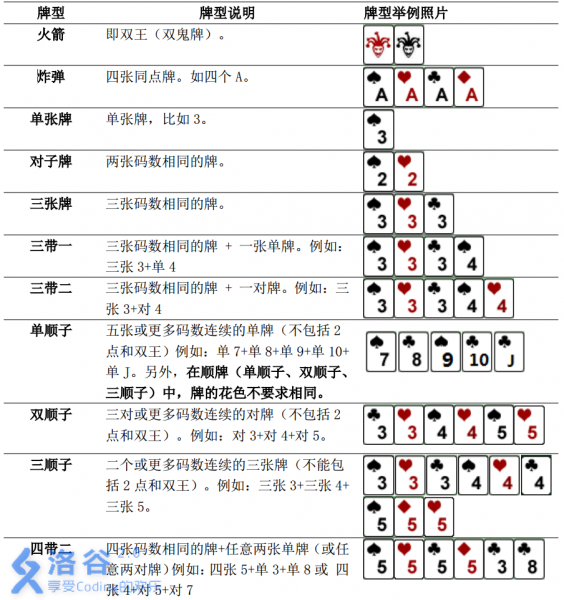题目类型:DFS+模拟
传送门:>Here<
**题意:你有(N)张手牌,按照以下打法,最少打几次全部打完
**
解题思路
由于数据范围较小,明显就是爆搜。但是也不能真的“爆”搜,不然真的会爆……
考虑剪枝以及优化。很明显可以用一个类似记忆化的方法,当目前的次数已经超过已有的最小答案时即退出
那么是不是真的要搜索每一次用哪种方式打呢?肯定不是。
我们发现,题目要求我们最快打完,这与出牌的顺序毫无关系。如果我总是要出一个单顺子和四带二,那么先出哪个毫无关系。所以我们总是先考虑长的,先把长的出了,再出短的。因为这等价于先出短的再出长的。
我们发现除顺子以外的各种类型中,题目是帮你凑好的。也就是,只需要按照一个贪心策略取出就好了,并不需要(DFS)。四带两对里包括了炸弹和对子牌,因此如果可以出四带两对绝不出炸弹。因此我们肯定先出四带几再出炸弹。同样,我们肯定先出三带几再出三张……因此我们发现(4,3,2,1)的单排一定留到最后出。那么只需要考虑四带几和三带几怎么个顺序就好了。我们发现一个四带二等于一个三带二和一张单排,因此四带二肯定优于三带二,其他的同理。
于是我们得到贪心策略了。但是这里要注意,四带两张的要优先于四带一对((yy)一下,出单牌的话两张需要两次,一对只需要一次)
因此我们只需要深搜顺子的出牌顺序,然后贪心剩下的牌。答案累积,打擂即可
Code
代码能力堪忧~
/*By DennyQi 2018*/
#include <cstdio>
#include <queue>
#include <cstring>
#include <algorithm>
#define r read()
using namespace std;
typedef long long ll;
const int MAXN = 10010;
const int MAXM = 20010;
const int INF = 1061109567;
inline int Max(const int a, const int b){ return (a > b) ? a : b; }
inline int Min(const int a, const int b){ return (a < b) ? a : b; }
inline int read(){
int x = 0; int w = 1; register char c = getchar();
for(; c ^ '-' && (c < '0' || c > '9'); c = getchar());
if(c == '-') w = -1, c = getchar();
for(; c >= '0' && c <= '9'; c = getchar()) x = (x<<3) + (x<<1) + c - '0'; return x * w;
}
int T,N,x,y,ans;
int num[20],cnt[20],tmp[20];
inline void Init(){
ans = INF;
memset(num, 0, sizeof(num));
memset(cnt, 0, sizeof(cnt));
}
inline int CulculateSingle(){
int res = 0;
memset(tmp, 0, sizeof(tmp));
for(int i = 3; i <= 16; ++i){
++tmp[cnt[i]];
}
while(tmp[4] >= 1 && tmp[2] >= 2){
tmp[4] -= 1, tmp[2] -= 2;
++res;
}
while(tmp[4] >= 1 && tmp[1] >= 2){
tmp[4] -= 1, tmp[1] -= 2;
++res;
}
while(tmp[4] >= 1 && tmp[2] >= 1){
tmp[4] -= 1, tmp[2] -= 1;
++res;
}
while(tmp[3] >= 1 && tmp[2] >= 1){
tmp[3] -= 1, tmp[2] -= 1;
++res;
}
while(tmp[3] >= 1 && tmp[1] >= 1){
tmp[3] -= 1, tmp[1] -= 1;
++res;
}
while(tmp[4] >= 1){
--tmp[4];
++res;
}
while(tmp[3] >= 1){
--tmp[3];
++res;
}
while(tmp[2] >= 1){
--tmp[2];
++res;
}
while(tmp[1] >= 1){
--tmp[1];
++res;
}
return res;
}
void DFS(int step){
if(step >= ans){
return;
}
int tmp = CulculateSingle();
ans = Min(ans, tmp + step);
bool flg;
for(int len = 2; len <= 12; ++len){
for(int S = 3; S + len - 1 <= 14; ++S){
flg = 1;
for(int i = S; i < S + len; ++i){
if(cnt[i] < 3){
flg = 0;
break;
}
}
if(flg){
for(int i = S; i < S + len; ++i){
cnt[i] -= 3;
}
DFS(step+1);
for(int i = S; i < S + len; ++i){
cnt[i] += 3;
}
}
}
}
for(int len = 3; len <= 12; ++len){
for(int S = 3; S + len - 1 <= 14; ++S){
flg = 1;
for(int i = S; i < S + len; ++i){
if(cnt[i] < 2){
flg = 0;
break;
}
}
if(flg){
for(int i = S; i < S + len; ++i){
cnt[i] -= 2;
}
DFS(step+1);
for(int i = S; i < S + len; ++i){
cnt[i] += 2;
}
}
}
}
for(int len = 5; len <= 12; ++len){
for(int S = 3; S + len - 1 <= 14; ++S){
flg = 1;
for(int i = S; i < S + len; ++i){
if(cnt[i] < 1){
flg = 0;
break;
}
}
if(flg){
for(int i = S; i < S + len; ++i){
cnt[i] -= 1;
}
DFS(step+1);
for(int i = S; i < S + len; ++i){
cnt[i] += 1;
}
}
}
}
}
int main(){
T = r, N = r;
while(T--){
Init();
for(int i = 1; i <= N; ++i){
x = r, y = r;
if(x == 2) x = 15;
else if(x == 1) x = 14;
else if(x == 0) x = 16;
++num[x];
}
for(int i = 3; i <= 16; ++i){
cnt[i] = num[i];
}
DFS(0);
printf("%d
", ans);
}
return 0;
}
